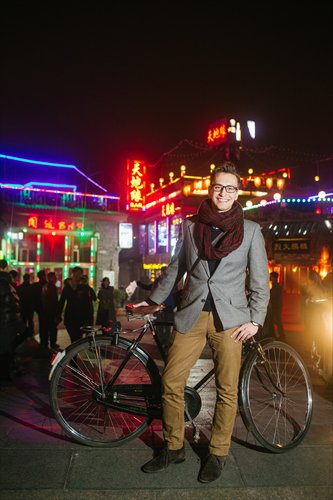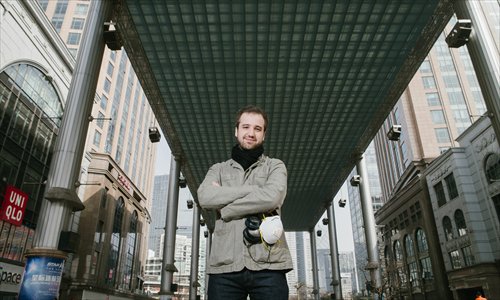Transplanted New Yorkers talk culture shock and urban affinities from the fast pace of Manhattan to the hutong of Beijing

New York transplant Chris Lipinski likes to ride his bike through the hutong of Beijing's old neighborhoods on his way to or from work or meeting with friends. Photo: Li Hao/GT
Wearing a heavy gray blazer and a crimson knitted scarf, 26-year-old Chris Lipinski climbs on his Forever-brand bicycle and begins to navigate the winding hutong of Beijing's downtown. He's just gotten off work at his job as the principal of an international kindergarten in Wangjing and is headed for dinner at Zhang Mama, a hip Sichuan restaurant in Gulou, where his friends are already waiting for him.
Some people may balk at Beijing's larger-than-life scale or wide throughfares, but not Lipinski, a New York native. Since moving here four years ago, he says he's quickly become accustomed to the city and its pace of life.
"As a New Yorker, I like to explore and try new things," he says. "My father always used to take me out to explore the city when I was very young. So I've found it's not really a big problem to find my way through the spider web-like hutong or the complicated underground network [here]," said Lipinski.
The connection between Beijing and New York isn't as tenuous as you might think. Among New York's more high-profile transplants is none other than NBA-cum-CBA player Stephon Marbury who is currently preparing to shoot a documentary about his life in China entitled My Other Home, Beijing.
According to a report by China National Radio website, the film will tell the story of how Marbury, who grew up in Brooklyn, succeeded in launching a new career playing basketball in China, and making Beijing his new home. The film will reportedly begin screening this October.
Of course, few New Yorkers in Beijing can claim the same level of success as Marbury, but the ones interviewed by Metropolitan agreed that there are certain things they all share - an affinity for fast-paced living, an openness to new ideas and a love for their new home.

Zachary Gidwitz at The Place with an air filter. Though many New Yorkers say Beijing rivals their hometown in terms of vibrancy and culture, among its drawbacks is the air pollution. Photo: Li Hao/GT
Finding a new home in Beijing
Almost every morning before going out, Lipinski spends time putting together his outfit for the day and making sure that his hair is in place.
He says he gets cut at the Lido location of upscale Beijing salon Toni & Guy, adding that the stylists there treat people's hair like pieces of art. As for clothing, he usually opts for tasteful, independently designed pieces at high-end consignment stores, in contrast to the Chinese preference for big brands like Gucci and Prada.
"New York is a very developed city with 'old' money, so most New Yorkers don't feel the need to wear name brands to show off. They just want simple elegance."
His sense of style even extends to his choice of transportation: a vintage cruiser made by Shanghai's classic Forever brand that cost him a cool 800 yuan ($123.04). "I like biking very much, as in New York," said Lipinski, who added that he loves the design of his bike. "It has a kind of simple elegance. It is old, classic and simple."
Yet Lipinski says that what most attracts him to Beijing is the blend of cultures. "When Chinese and Western culture mix, it is very interesting," said Lipinski. "Shanghai has less of that feeling; it's more like New York, an international city. But Beijing is more Chinese."
One example of this blend is the kind of fusion beers that you can find at Beijing's growing crop of microbreweries, many of which incorporate Chinese ingredients, like Sichuan pepper.
He remembers that his first time going to Great Leap, one of the first microbreweries in Beijing, his first thought was that it felt like any taproom in New York - until he tasted the beers, which featured unique Chinese twists.
"While not as diverse as New York, Beijing still does offer an amazing cultural, food and entertainment scene, so in that sense life isn't too different," he said.
Adjusting to a new work culture
Among the things New York is most famous for is its hustle and bustle, and while Beijing has plenty of bustle, according to Julian Mintzis, the CEO of a consulting company, it's sadly lacking in hustle.
"Back in New York, we have express trains," Mintzis says. He's just spent the morning traveling from one side of the CBD to the other to meet with a client - a trip that he says in New York would have taken half the time.
"New Yorkers value time very much, but I don't think that's as much the case for people in Beijing," he says.
It's been a stark comparison for Mintzis, who, as a CEO, generally tries to keep a tight schedule. In Beijing, he's run into a completely new way of doing business.
While meetings in the US, and especially New York, often strive to be an efficient and impersonal matter, the same isn't true here, where successful deals depend on forming relationships and bonds of trust.
The good news is that with a bit of time and patience, things usually proceed more smoothly.
Lipinski remembers that one of the biggest challenges he faced as a new principal was hiring talent. Many of the school's customers, he said, were Chinese parents, who preferred white, male teachers and were unsure of staff who didn't fit the bill.
Lipinski started out trying to talk with them, which did not work. After giving the problem patient thought, though, he came up with a new solution: hire the teachers on a trial basis, and give the parents a chance to warm up to them as they see how much their children are progressing.
"There was a lot of doubt to overcome at first," he said. "But it didn't take long for the focus to shift away from the teachers' skin color or appearance as the parents began to take note of their ability. After awhile, their doubt turned to trust and loyalty."
Living in a city with opportunities
Of course, there are challenges to life in Beijing. Zachary Gidwitz, an American who's lived off-and-on in New York since 2005 and in Beijing since 2010, says one issue confronted by many long-term expats is the question of assimilation. While the internationalism of New York makes it easy for newcomers from all over the world to blend in, many foreigners feel that in Beijing, they will always be considered "laowai."
"I have a friend whose Chinese is much better than mine who has been here for 10 years," says Gidwitz, the founder of an agricultural startup in Beijing.
"He does not speak Putonghua, he speaks Beijinghua. He still feels that he is regarded as a monkey who can talk."
What makes up for it is the tremendous job opportunities that Beijing can provide, especially as an exciting new frontier for entrepreneurs with innovative ways of doing things - which is the essence of the New York spirit.
"It's a relatively new city for business and so fewer standards have been established. That makes it a bit chaotic but also rich with opportunities, ones you can't find in more settled arenas," he said. "I like that energy, but you must have an anchor, otherwise you can get swept away."
Mintzis has also noticed a recent emphasis on innovation and creativity in Beijing, as the local government attempts to foster new startups in fields like the tech industry through subsidies and business incubators.
Beijing's even starting to boast the same kind of star power that New York is famous for. Daniel Finn, who lived in Manhattan before coming to Beijing, says he was excited when, on a recent visit, Mark Zuckerburg took a run through Tiananmen Square, and said he hopes that Beijing continues to draw more international figures while retaining its natural color.
"New York is well known for celebrities making casual public appearances. John Lennon used to waltz all over the place in New York City. It is great to see it happening here on an international level, not just with local Chinese stars," said Finn.
As for Lipinski, though he plans to return to New York to pursue his master's in early childhood education, he says he'll come back to Beijing afterward to continue his work.
"If pollution weren't an issue, I would come back in a heartbeat," he says. "The main draw for coming back is that I want to have a positive impact on others by giving them a healthy social and emotional start to their lives."
Newspaper headline: Out of the Big Apple